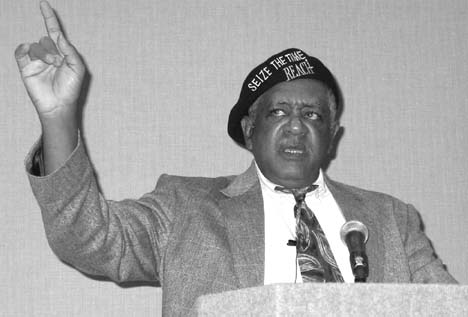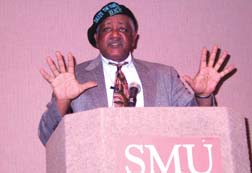
Seale speaks mind on Black Panther movement
Chances are, a visit to a local video or bookstore will not give you the true story of the Black Panther Party.
The truth came out Thursday night when co-founder Bobby Seale was on hand to recount his story. Program Council’s Black Awareness Committee sponsored the event.
“The Black Panther Party was based upon developing a thorough knowledge of the African-American struggle,” Seale said.
The organization evolved amid the ongoing civil rights protest movement of the 1960s, he said. It fought to end institutionalized racism in the United States.
As a 26-year-old college student in 1962, Seale said he had no interest in the civil rights movement. However, after exposure to activists such as Huey Newton, Marcus Garvey and writer W.E.B. DuBois, he began to take interest in the movement.
“I passed rallies on the street corner on my way to school,” he said. “[Before this] I knew nothing about my African-American heritage. It blew my mind.”
Martin Luther King, Jr. spoke in Seale’s home of Oakland, Calif., the same year. It was a turning point in Seale’s life.
“Listening to [King] speak, I was a guy getting inspired for the first time,” Seale said.
The Vietnam War served as fuel for the movement. In the 1960s, 29 percent of all soldiers dying on the front line were black, he said.
One night in 1966, Seale recited a poem from the Liberator Magazine. It told of a black man who refused to fight for a country that would not recognize his human rights. As he spoke, a crowd gathered. The last line of the piece contained a profanity. Officers attempted to arrest Seale for using obscene language. A fight ensued. Seale was arrested and charged with assault with a deadly weapon on a police officer.
The outcome of his trial left Seale with a year of probation, a lenient sentence, he said.
“It was this night that I decided to start an organization,” he said.
Together with Newton, Seale formed a 10-point plan of goals for the Black Panther Party. Ten corollary points stated the beliefs of the organization, he said.
“We crossed racial lines,” Seale said. “Our original slogan was ‘All power to all the people.’ “
The two decided that the main focus of the organization would be to address rampant police brutality.
“Our organization was different from other civil rights organizations because we took a stance on the right of self-defense,” he said.
Members patrolled and monitored police officers wearing all black, including berets, gloves, leather jackets, pleated plants and starched shirts.
“We were sharp,” he said.
Seale’s account of the organization’s first patrol garnered laughs from the audience.
He said all actions of the party, including toting weapons and observing police officers, were legal. Newton had attended two years of law school. The two men were well versed in the public’s legal rights.
“It blew the cops’ minds that we knew that much about the law,” he said.
The Panthers continued patrolling for six months and captured the country’s imagination. Police brutality decreased by 80 percent, due to fear of the organization, he said.
“People would tell the cops, ‘You better not get brutal, or we’ll get the Panthers on your ass,’ ” Seale said.
The death of King Jr. affected the Panthers enormously. Branches emerged around the country and membership increased by the thousands. By 1968, the group had more than 5,000 members and 48 chapters.
By 1969, the Panthers were a government target, Seale said. All over the country, at Black Panther headquarters, shootouts occurred between members and the FBI.
“J. Edgar Hoover [and the FBI] attacked all of our chapters. It was a mini-civil war in our American history,” he said. “They wanted to terrorize us out of existence.”
Seale said the FBI spent millions of dollars and killed 29 members in its effort to eliminate the organization.
He resigned as leader of the group in 1974.
Seale encouraged those in the audience to take a stand and make a difference in the world.
“What is important is where your heart and mind and soul are,” he said.
He urged students to attach their hearts to a cause and act upon it.
Citing an example from his own life he said, “Running around hollering about black power is one thing, but to implement it is another.”
Audience members were enlightened by Seale’s comments.
“Before going in, I thought the Black Panther Party was violent and dangerous. But tonight I heard it was more about peace and bringing all races together,” said Beulah McDonald, a junior English major. “It opened my eyes.”
Byron Sanders, a Program Council member and chairman of the Black Awareness Committee, arranged for Seale’s visit. He calls the activist an inspiration.
“I learned about the Black Panthers in high school, but when I learned more about Mr. Seale I really began to see the depths of the organization and how they affected the community,” he said. “He is a person of true social reform and is very progressive minded.”
Seale closed his comments with a reminder to audience members to not dwell on the past.
“I am not looking for the ’60s anymore. I know better,” Seale said. “This is a forward movement.”

Seale speaks mind on Black Panther movement








